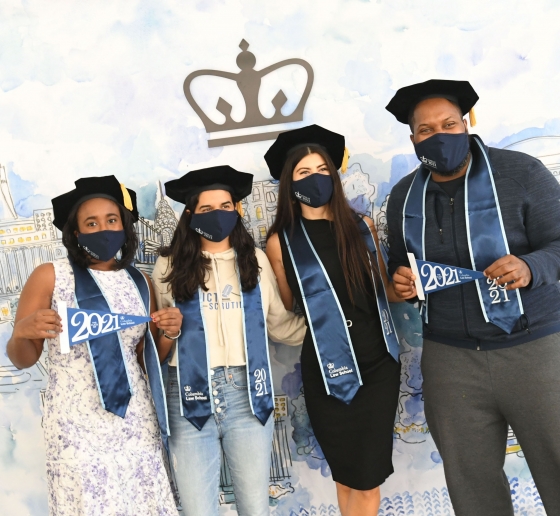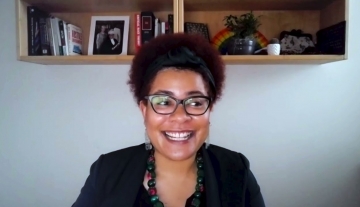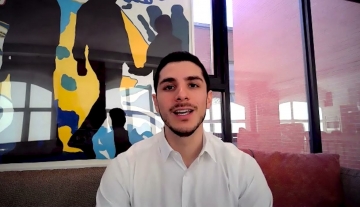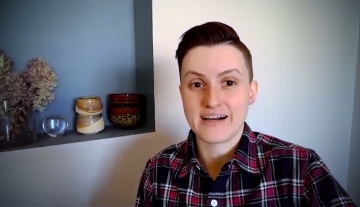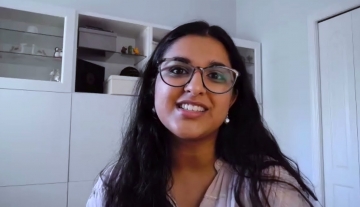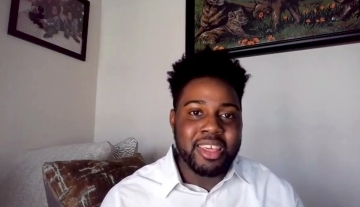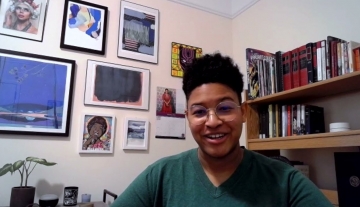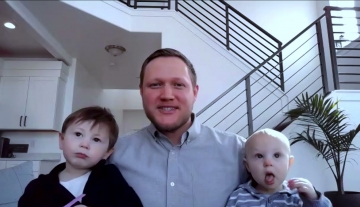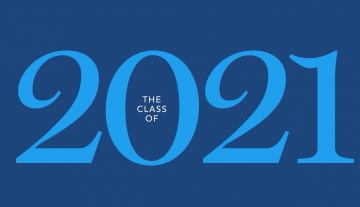Graduation 2021: Highlights of a Special Day
Columbia Law celebrated the graduation of the 2021 cohort of J.D., LL.M., and Executive LL.M. students with a virtual ceremony, featuring keynote speaker U.S. Secretary of State Antony Blinken ’88, on April 29, 2021.
Capping a Columbia Law School experience like none before it, the Class of 2021 was cheered on by family, friends, and members of the Law School community as they watched the online ceremony from locations all over the world. The graduates were sent on their way with advice from faculty, reminiscences from classmates, and a reminder from U.S. Secretary of State Antony J. Blinken ’88 that the United States’ “greatest source of strength [is] our commitment to the rule of law.”
Welcoming Graduates and Friends
Graduation Co-Chair Lune Klappe ’21 LL.M. summed up the unique experience of the Class of 2021 as it overcame the challenges of the pandemic that forced the Law School to switch to remote learning. “Sitting in class with one or even two masks on, coming up for a gasp of air on Revson Plaza only to find out that is now a one-way route, slowly forgetting what the bottom half of your classmate’s face looks like, raising your blue hand in Zoom-land, reminding professors to hit the record button, or even taking classes asynchronously from opposite time zones—our class has conquered all of these challenges,” Klappe said. “Today is the day that we celebrate not only the drive and tenacity that brought us to Columbia and allowed us to thrive here. Today, we also honor the strength each of us had to continue pursuing our dreams despite setbacks and suboptimal circumstances. We deserve to take this as the joyful occasion that it is.”
Graduation Co-Chair Chizoba D. Ukairo ’21 introduced Gillian Lester, Dean and Lucy G. Moses Professor of Law. Only the second woman to lead the 163-year-old Law School, Dean Lester is “a strong and compassionate leader [who] has been a graceful example of how to lead effectively even in the midst of uncertainty,” Ukairo said.
Law school for the Class of 2021 has included a global pandemic, widespread racial reckoning, and the ravages of climate change. “You have arguably seen more chaos, convulsion, and unpredictability over the last 14 months than past graduates have seen in their first decade of practice,” Dean Lester said. As a result, “you have been trained as lawyers in the twin registers of change and adaptation.”
There is more turmoil to come, she cautioned the graduates. “Our society is poised on the cusp of a period of explosive reimagination and contestation” in areas from voting rights to information governance. The result is “an urgent call to retool our core civic, political, legal, and regulatory architecture.”
The Class of 2021 is equal to the challenge “because you have had the guts and the stamina to earn your degrees in the most extraordinary of times,” she said. “While a memory of upheaval will surely mark this period in the Law School’s history, the most important thing that anyone will remember in this story is you: your achievements, your poise, your perseverance.”
Student Speakers: Make Decisions “Resonant With Justice.”
The graduation co-chairs introduced student speakers Oluwatumise “Tumise” Asebiomo ’21, editor in chief of the Columbia Law Review, and Air Force Major David Taylor Dayton Jr. ’21 LL.M., who were chosen by popular vote of their classmates.
“We came to law school to examine and contend with the law: what it was, where it is now, and what it should be,” Asebiomo said. “And, knowingly or not, we came to law school to learn about ourselves and our place in the world, our place as changemakers.”
Asebiomo praised her classmates for providing resources for students grappling with the pandemic and remote learning and for conducting anti-racism training through the Advanced Mediation Clinic. “It’s been us—the students—who have created some of the most enriching and beautiful opportunities here by using our own time, attention, and labor,” she said. “I am graduating among people who will not only change legal education but who will also change the world. And as always seems to be the case, this change is urgent.”
Follow the example of Justice Ruth Bader Ginsburg ’59, Asebiomo said: “Her teaching that most touched me was this: She was the one who needed to feel most comfortable with her decisions. As we make decisions now and as future lawyers, we must be comfortable that our decisions are resonant with justice. . . . This is a reminder that for some us, myself included, the revolution is reality.”
Dayton asked students to remember all they had overcome to get to and through law school and to acknowledge the help of those who believed in them. “It is likely that we all would not be here today if not for someone who pushed us past those struggles and saw in us something more than we saw in ourselves,” he said, adding that in his case, his wife, Heather, “encouraged me daily to keep pressing on and believed that if I did, I would someday succeed. Without her, I would not be here today.”
After graduation, it is time to pay that help forward, Dayton said. “It is likely that most of us will have doors opened because of our time here and our degree from this university. May we be willing to not rush in but stand and hold open those doors for others who have not yet been so fortunate. Although our focus now shifts to putting our knowledge and education to use, may we not do so in selfishness, but with a strong desire to help others.”
Maeve Glass ’09 Awarded Willis L.M. Reese Prize for Excellence in Teaching
Graduation Co-Chair Austin Collier ’21 introduced Associate Professor Maeve Glass ’09, winner of the 2021 Willis L.M. Reese Prize for Excellence in Teaching, and praised her ability “to connect with and inspire her students so deeply, during and outside of class, even with the challenges presented by the pandemic and distance learning this past year.” That connection, he said, “shows the depth of her dedication to teaching, which is rivaled only by her scholarship.”
Glass, whose scholarship has focused on the legal history of slavery, reminded graduates of Pierson v. Post, the foundational property law case from 1804 about a hunters’ dispute over a fox. “This old case has one last, parting lesson to teach us,” she said. “Every story we tell, every constellation of facts we assemble, has a frame. Change the frame, and you change the story. Change the stories that matter, and you might just change the world.”
The fox case exists in “a frame of erasure” that ignores “a vast web of stolen lands and stolen lives” in the history of the United States, Glass said. She urged students always to “question that which you assume to be settled, bring your whole self to bear, and do it with love and humility.”
“We need to listen to the words of the abolitionists, the refugees, the removed, the theorists, the lawyers, the poets, the artists who rose up and refused to sit down, who, at the risk of their own lives, kept a record of wrongs that could not be heard in the courts of law,” she said. “We are the beneficiaries of those who dared to question that opening frame, those who lifted up and made audible the truths that it could not, would not hold. As lawyers, leaders, teachers, we are duty-bound to continue the tradition they began.”
“Keep changing the frame, and you will make this world a little more empathetic, a little more compassionate, a little more just.”
Secretary Blinken: Strengthening Our Justice System Is Urgent Work
Collier also introduced the ceremony’s keynote speaker, Secretary of State Antony J. Blinken ’88, who before his confirmation in January to the Biden administration cabinet had previously served as deputy secretary of state and deputy national security advisor in the Obama administration. Blinken, who was awarded Columbia Law School’s Medal for Excellence in 2016, is “a dedicated Columbia alumnus, an author, and a musician who you can listen to on Spotify under the name ‘Ablinken.’”
Speaking three months into his tenure as secretary of state, Blinken told graduates that supporting the rule of law is “a foreign policy priority as well as a national one” in the face of threats to human rights and democracy worldwide.
“Authoritarianism is on the rise,” he said. “The autocrats are making the argument that they can deliver for their people in a way that democracy can’t. So the challenge we face today is to prove not only that democracy can deliver results for people, but that it can do it in a way that’s fair, equitable, transparent, humane. Our ability to stand up for these values depends on whether we’re living up to them at home.”
Blinken, the 71st U.S. Secretary of State, cited John Jay, the nation’s first, who graduated from King’s College (as Columbia was then known) in 1764.
Jay, who went on to be the first chief justice of the U.S. Supreme Court, “understood that our country’s greatest source of strength would be our commitment to the rule of law,” Blinken said. “The most powerful people in the land—judges, legislators, executive officers, including the President of the United States—are bound by the law just like everyone else.”
That commitment has been tested throughout the nation’s history, he said. “We’ve seen how justice can be deeply unequal for people of color, women, immigrants, LGBTQ people, and other marginalized populations. We’ve seen rights that should be sacred, like the right to vote, under threat.”
To confront the failings of the nation in living up to its values of fairness and equity “can be painful, even ugly,” Blinken said. “But it makes us who we are, and, I believe, it sets us apart from other countries. That’s the spirit that we’ve got to bring to the urgent work of strengthening our justice system to make sure it honors the principle that all people are truly equal in rights and in dignity. And as the most recent graduates of one of the most distinguished law schools on Earth, no one is better positioned to do this work than you.”
Blinken also spoke to the international students among the graduates: “Columbia has an outstanding tradition of educating women and men from abroad who then become legal scholars, advocates, diplomats, and judges around the world. You in particular have a powerful opportunity to stand up for democracy and the rule of law around the world.”
He concluded his speech by reminding all students that “whatever your path, you can protect equal justice through the work you do. . . . You can do it by speaking up for people whose voices are silenced and challenging your colleagues and peers to do better for the planet and the less powerful. You can do it by bringing others along with you. You know this. The law can be inaccessible, confounding, intimidating, especially for those people whose lives are most affected by it. You have the knowledge to navigate it. You can make it legible to others. And in this way, you can empower them to fight for justice too.”
Congratulations to the Class of 2021!
“We are unique to the history of this university, and I am glad that our paths crossed here. Onwards.”—Graduation Co-Chair Chizoba D. Ukairo ’21
